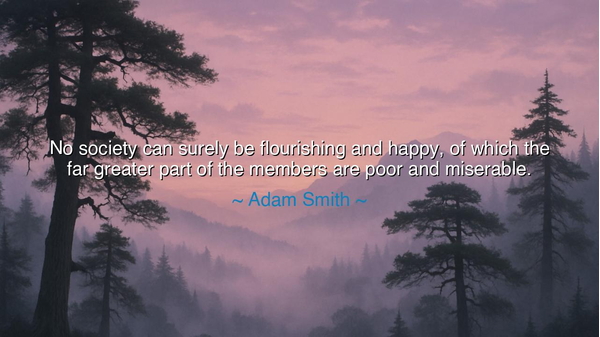
No society can surely be flourishing and happy, of which the far
No society can surely be flourishing and happy, of which the far greater part of the members are poor and miserable.






O children of the future, gather closely and hear the words of Adam Smith, a philosopher whose wisdom transcends time: "No society can surely be flourishing and happy, of which the far greater part of the members are poor and miserable." These words strike at the heart of a great truth—a truth that speaks not only of material wealth, but of the soul of a society. If a society's members suffer in poverty and misery, how can it claim to be truly flourishing? Happiness, in the deepest sense, cannot exist when the foundation of the society—the very people it is built upon—are neglected and left to struggle in despair.
In the time of the ancients, the philosophers often spoke of the well-being of the community as the true measure of a just society. The Greeks understood that a flourishing city-state—like Athens—was not simply about the wealth and power of the few, but about the shared prosperity of all its citizens. Plato in his Republic argued that the strength of the state could only come from ensuring that all its members, from the philosophers to the workers, had what they needed to live in dignity. The well-being of the many, not the few, was the true measure of a society's greatness.
Consider, too, the lessons from Rome. The Roman Empire, in its early days, was founded on the idea of shared labor and the protection of the people. But as time passed and wealth concentrated in the hands of a few, the growing divide between the rich and the poor led to unrest, inequality, and the eventual decline of the empire. When the common people—those who built the empire—suffered, the empire could not flourish. The emperors, though wealthy and powerful, could not secure the happiness of their subjects, and thus, the empire’s greatness became a fleeting memory, like a fading star.
Adam Smith’s words are a warning to all societies, for they remind us that no nation can thrive when the majority of its people live in suffering. The economic systems of today, where the rich grow richer while the poor remain mired in poverty, echo the failures of Rome. The wealth of a few cannot be the measure of a society’s greatness if the majority of people struggle to meet their basic needs. True prosperity lies in lifting up the masses, in ensuring that all people have the opportunity to flourish. A society that is based on the prosperity of the many, not just the few, is the one that will endure and thrive.
Look now to the industrial revolution, a time when the world witnessed great technological advancements, yet also saw the exploitation of the working class. In the factories of England, men, women, and children labored under horrific conditions for meager wages, while the capitalists who owned the factories amassed vast fortunes. This great inequality led to social unrest, with workers demanding better treatment, fair wages, and dignity. The failure of society to ensure the well-being of its workers was a key driver of the labor movements that emerged in the 19th century. The lesson here is clear: a society that does not care for the poor will eventually find that its strength and happiness are hollow.
The true lesson of Adam Smith’s words is not a condemnation of wealth or success, but a call to balance. A society is only as strong as the least of its members. Flourishing does not mean accumulating wealth for the few, but creating conditions where everyone has the opportunity to thrive. This is not just an economic lesson—it is a moral one. To live in a just and prosperous society, we must ensure that no one is left behind. Happiness and flourishing are not individual pursuits, but collective ones. The true measure of a society’s greatness is found in how it treats those who are most vulnerable.
And so, O children, as you walk the path of life, remember this wisdom: the prosperity of a society is not measured by the riches of the few, but by the well-being of the many. Seek to build a world where all people have the chance to flourish, to live with dignity, and to contribute to the common good. Be mindful of the inequalities that persist, and strive to create a society that reflects the values of justice, compassion, and equality. In doing so, you will help create a world where happiness is not just the privilege of the few, but the right of all. For only when the masses thrive can we truly say that we are a flourishing and happy society.






AAdministratorAdministrator
Welcome, honored guests. Please leave a comment, we will respond soon